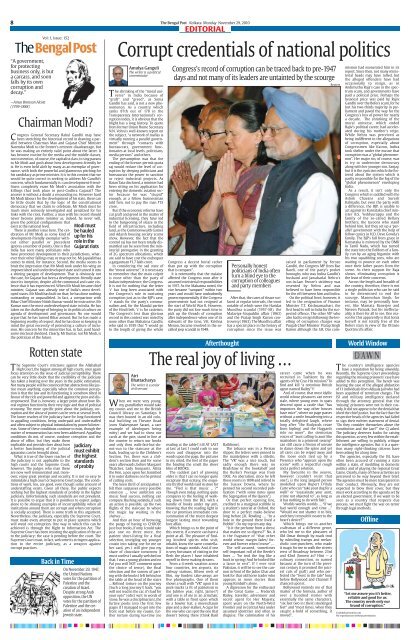29_page01-city final_Layout 1
29_page01-city final_Layout 1
29_page01-city final_Layout 1
You also want an ePaper? Increase the reach of your titles
YUMPU automatically turns print PDFs into web optimized ePapers that Google loves.
8 The Bengal Post Kolkata Monday November <strong>29</strong>, 2010<br />
EDITORIAL<br />
TheBengalPost<br />
“A government,<br />
for protecting<br />
business only, is but<br />
a carcass, and soon<br />
falls by its own<br />
corruption and<br />
decay.”<br />
—Amos Bronson Alcott<br />
(1799-1888)<br />
Vol: 1, Issue: 152<br />
Chairman Modi?<br />
Congress General Secretary Rahul Gandhi may have<br />
been stretching the historical record in drawing a parallel<br />
between Chairman Mao and Gujarat Chief Minister<br />
Narendra Modi to the former’s eminent disadvantage, but<br />
he was making an entirely valid point about the latter. It<br />
has become routine for the media and the middle classes,<br />
not to mention, of course, the capitalist class, to sing paeans<br />
to Mr Modi and gush about how development-friendly he<br />
is. He is even held aloft by many as an exemplar of governance,<br />
with both the powerful and glamorous pitching for<br />
his candidacy as prime minister. It is in this context that we<br />
would be quite correct in seeking to address Mr Gandhi’s<br />
concern, which fundamentally is: can development-friendliness<br />
completely erase Mr Modi’s association with the<br />
killings that took place in post-Godhra Gujarat? The<br />
answer is without a doubt a resounding no. However hard<br />
Mr Modi labours for the development of his state, there can<br />
be little doubt that by the logic of the constitutional<br />
democracy that we claim to celebrate, Mr Modi must be<br />
much more seriously investigated and penalized for his<br />
links with the riots. Further, a man with his record should<br />
never become prime minister as, indeed, he never will,<br />
given the political configurations that<br />
exist at the national level.<br />
There is another issue here. The celebration<br />
of Mr Modi as some kind of<br />
development-friendly exemplar without<br />
either parallel or precedent<br />
ignores a number of points. One is that<br />
India has seen many politicians who<br />
have promoted development in their jurisdictions, whatever<br />
their other failings may or may not be. Ms Jayalalithaa<br />
comes to mind, for instance. Second, the media seems to<br />
bruit the impression that Mr Modi took under his wing an<br />
impoverished and underdeveloped state and turned it into<br />
a shining paragon of development. That is obviously not<br />
the case, for Gujarat has been a development-friendly state<br />
since its inception, despite all the communal and caste violence<br />
that it has experienced. When Mr Modi became chief<br />
minister, Gujarat was already one of India’s most developed<br />
states. Mr Modi has built on that; he has done nothing<br />
outstanding or unparalleled. In fact, a comparison with<br />
Bihar Chief Minister Nitish Kumar would be instructive. Mr<br />
Kumar runs the most underdeveloped state in India. He has<br />
taken on the challenge of bringing to its political culture an<br />
agenda of development and governance. No one would<br />
argue that he has turned Bihar around. But he has made a<br />
beginning worthy of respect. And he has done so keeping in<br />
mind the great necessity of promoting a culture of inclusion.<br />
His concern for the minorities has, in fact, paid handsome<br />
electoral dividend. Clearly, Mr Kumar, not Mr Modi, is<br />
the politician of the future.<br />
Rotten state<br />
The Supreme Court’s strictures against the Allahabad<br />
High Court, the biggest among all high courts, once again<br />
focus attention on the issue of judicial corruptibility. There<br />
can be very little doubt that the credibility of the judiciary<br />
has taken a beating over the years in the public estimation.<br />
Not many people will be convinced that abstractions like justice<br />
mean anything, especially when the common perception<br />
is that the law and its functioning is somehow tilted in<br />
favour of the rich and powerful and against the poor and disempowered.<br />
That is, however, a larger point about how liberal<br />
regimes function by their very logic and that of political<br />
economy. The more specific point about the judiciary, corruption<br />
and the abuse of power can be seen at several levels.<br />
The lower reaches of the judiciary have for long functioned<br />
in appalling conditions, being underpaid and understaffed<br />
and often subject to physical intimidation by powerful interests.<br />
Some of these conditions continue to exist, though the<br />
matter of remuneration has now been addressed. Appalling<br />
conditions do not, of course, condone corruption and the<br />
abuse of office, but they make them<br />
explicable and provide clues about how<br />
a better functioning of the judicial<br />
apparatus can be brought about.<br />
What is true of the lower reaches of<br />
the judiciary is not applicable to the<br />
high courts and the Supreme Court,<br />
however. The judges who man these<br />
are now well remunerated and, more-<br />
Back in Time<br />
Modi must<br />
be hauled<br />
up for his<br />
role in the<br />
Gujarat riots<br />
Judiciary<br />
must exhibit<br />
the highest<br />
standards<br />
of probity<br />
over, enjoy great prestige and security. It is not so easy to<br />
intimidate a high court or Supreme Court judge. The conditions<br />
of work, too, are good, even though some amount of<br />
understaffing exists. Given all these, the public expects<br />
nothing but the highest standards of probity in the higher<br />
judiciary. Unfortunately, such standards are not prevalent.<br />
It is possible to argue that it is pointless to expect judges<br />
alone to be shining examples of incorruptibility when all<br />
institutions around them are corrupt and when corruption<br />
is socially accepted. There is some truth in this argument.<br />
Nevertheless, the judiciary, especially the Supreme Court,<br />
must make every attempt to put in place systems which<br />
will weed out corruption. One way in which this can be<br />
achieved is through the Right to Information Act. The<br />
Supreme Court has been resisting the application of the act<br />
to the judiciary; the case is pending before the court. The<br />
Supreme Court must, in fact, welcome its stringent application<br />
to the entire judiciary, as a weapon against<br />
corrupt practices.<br />
On November <strong>29</strong>, 1947,<br />
the United Nations<br />
votes for the partition of<br />
Palestine and the<br />
creation of Israel.<br />
Despite strong Arab<br />
opposition, the UN<br />
votes for the partition of<br />
Palestine and the creation<br />
of an independent<br />
Jewish state.<br />
Corrupt credentials of national politics<br />
Amulya Ganguli<br />
The writer is a political<br />
commentator<br />
The shrinking of the “moral universe”<br />
in India because of<br />
“graft” and “greed”, as Sonia<br />
Gandhi has said, is not a new phenomenon.<br />
As a country which<br />
ranks 87th out of 178 in the<br />
Transparency International’s corruption<br />
index, it is obvious that the<br />
blight has a long history. To quote<br />
from former Union Home Secretary<br />
N.N. Vohra’s well-known report on<br />
the subject, “a network of mafias is<br />
virtually running a parallel government”<br />
through “contacts with<br />
bureaucrats, government functionaries<br />
at local levels, politicians,<br />
media persons” and others.<br />
The presumption was that the<br />
ending of the licence-permit-quota<br />
raj would reduce the level of corruption<br />
by denying politicians and<br />
bureaucrats the power to sanction<br />
or reject industrial projects. As<br />
Ratan Tata disclosed, a minister had<br />
been sitting on his application for<br />
entering the domestic aviation sector<br />
because he was “stupid”<br />
enough, as a fellow businessman<br />
told him, not to pay the man `15<br />
crore.<br />
But if the economic reforms have<br />
cut graft and greed in the matter of<br />
industrial licensing, they have led<br />
to the burgeoning of sleaze in the<br />
field of infrastructure, including<br />
land, as the Commonwealth Games<br />
and Adarsh housing society scams<br />
show. However, the fact that the<br />
control raj has not been totally dismantled<br />
can be seen from the ministerial<br />
prerogative in the granting<br />
of 2G spectrum allocations, which<br />
are said to have cost the exchequer<br />
a gargantuan `1.7 lakh crore.<br />
In considering the sad state of<br />
the “moral universe”, it is necessary<br />
to remember that the main culprit<br />
is none other than the party of<br />
Indian independence, the Congress.<br />
It is not for nothing that the letter<br />
‘c’ has long been associated with<br />
the Congress’s role in nurturing<br />
corruption just as in the BJP’s case,<br />
‘c’ stands for the party’s communalism<br />
and, for the Mandal parties<br />
of the Hindi belt, ‘c’ is for casteism.<br />
The Congress’s less than glorious<br />
record in this context was noted by<br />
none other than Mahatma Gandhi,<br />
who said in 1939 that “I would go<br />
to the length of giving the whole<br />
Atri<br />
Bhattacharya<br />
The writer is a senior<br />
civil servant<br />
When we were very young,<br />
my grandfather would take<br />
my cousin and me to the British<br />
Council Library on Saturdays. It<br />
was then housed in an old colonial<br />
building on Theatre Road<br />
(now Shakespeare Sarani, a rare<br />
example of ideologues being<br />
witty) and we had to show our<br />
cards at the gate, stand in line at<br />
the counter to return our books<br />
and only then walk-fast-but-donot-run<br />
to the staircase at the<br />
back, leading up to the Children’s<br />
Section. Yes, there was a children’s<br />
section then and for some<br />
years afterwards, before Margaret<br />
Thatcher, Lady Ironpants, Attila<br />
the Hen, a pox upon her, banished<br />
it to outer darkness on the pretext<br />
of cutting costs.<br />
The keen thrill of anticipation I<br />
felt then surpasses every possible<br />
emotion … love ambition sex<br />
music food success, nothing can<br />
compare. Rushing sedately, if such<br />
an action is possible, up the two<br />
flights of the staircase to where<br />
the magic lay waiting in the<br />
shelves …<br />
And then an hour of browsing,<br />
the pangs of having to CHOOSE<br />
just four books, if only I could take<br />
just one no three more, the<br />
patient short-listing for a <strong>final</strong><br />
selection, inveigling my younger<br />
cousin into taking one for me on<br />
her card, yes I will give you my<br />
share of chocolate tomorrow (I<br />
must confess I usually welshed on<br />
that, I was a young glutton and no<br />
Pal you will NOT comment upon<br />
the choice of tense), the <strong>final</strong><br />
selection and the sorrow of parting<br />
with the books I left behind on<br />
the table at the head of the stairs<br />
…Refined torture on the journey<br />
(Such a long journey!) back, “you<br />
will not read in the car, it’s bad for<br />
your eyes” (edict writ in words of<br />
stone, he was a disciplinarian), the<br />
furtive peeks into the first few<br />
pages if I managed to get into the<br />
front seat before my cousin, further<br />
torture during tea-time (no<br />
Congress’s record of corruption can be traced back to pre-1947<br />
days and not many of its leaders are untainted by the scourge<br />
Congress a decent burial rather<br />
than put up with the corruption<br />
that is rampant”.<br />
It is noteworthy that the malaise<br />
affected the Congress soon after it<br />
assumed ministerial responsibilities<br />
in 1937. As the Mahatma noted, the<br />
vice became “rampant” within two<br />
years and would have undoubtedly<br />
grown exponentially if the Congress<br />
governments had not resigned at<br />
the start of World War II. However,<br />
the party did not lose much time to<br />
pick up the threads of corruption<br />
after independence when one of its<br />
stalwarts of the time, V.K. Krishna<br />
Menon, became involved in the socalled<br />
jeep scandal in 1948.<br />
Afterthought<br />
Personally honest<br />
politicians of India often<br />
turn a blind eye to the<br />
corruption of colleagues<br />
and party members<br />
After that, the cases of sleaze surfaced<br />
at regular intervals, the most<br />
notable of which were the Haridas<br />
Mundhra scandal (1957-58), the<br />
Malaviya-Sirajuddin affair (1963)<br />
and the Pratap Singh Kairon controversy<br />
(1963). The Mundhra affair<br />
has a special place in the history of<br />
corruption since the issue was<br />
The real joy of living …<br />
reading at the table!) till AT LAST<br />
at last at last I could rush to our<br />
room and disappear into the<br />
words upon the page, the pictures<br />
in my mind, the feel of the paper<br />
the binding the smell the sheer<br />
bliss of BOOKS.<br />
The saddest part of growing<br />
older is that I can no longer quite<br />
recapture that ecstasy, the exquisite<br />
thrill of worlds laid in store for<br />
me. “Fled is that music .. ?”<br />
Though even today, nothing quite<br />
compares to the feeling of walking<br />
down from the BCL with a<br />
bundle of books under my arm,<br />
knowing that the reading light in<br />
the car promises immediate consummation<br />
of the truest deepest<br />
longest lasting most rewarding<br />
love affair.<br />
Which brings us to the point of<br />
this reverie, if a reverie can have a<br />
point at all. The pleasure of finding<br />
kindred spirits who visit,<br />
inhabit, know the same constellations<br />
of magic worlds. And, if one<br />
is very fortunate, of visiting in the<br />
flesh the places I have inhabited<br />
myself in these waking dreams.<br />
From a 4-week vacation across<br />
four countries, ten airports, six<br />
railway stations, fifteen reels of<br />
film, my fondest take-aways are<br />
five photographs. One of them<br />
shows a wall with “VR” upon it in<br />
pock-marks (a fit of patriotism in<br />
the Jubilee year, right, James?)<br />
and one is of me in an armchair,<br />
with a table in front upon which<br />
lie a bowler hat, a meerschaum<br />
pipe and a deer-stalker. A cigar for<br />
the one who can spot the one that<br />
doesn’t belong there (think Basil<br />
Reuters<br />
Rathbone).<br />
The tobacco was in a Persian<br />
slipper, the letters were pinned to<br />
the mantelpiece with a stiletto.<br />
The ‘VR’ was a nice touch, but<br />
sadly enough there was no<br />
Bradshaw in the bookshelf and<br />
the Burke’s Peerage was from<br />
1902. An aberration, since he left<br />
those rooms in 1898 and retired to<br />
the Sussex Downs, where he<br />
penned his second recorded publication<br />
(“with some notes upon<br />
the Segregation of the Queen”).<br />
Or that perfect opening line,<br />
credited to a marginal scribble in<br />
a student’s tutorial at Oxford, the<br />
door to a perfect make-believe<br />
long before J.K. Rowling … “In a<br />
hole in the ground there lived a<br />
Hobbit”. On my top ten any day.<br />
“Is it the perfume from a dress/<br />
that makes me so digress?” No, it<br />
is the fragrance of “that other<br />
world whose margin fades/ forever<br />
and forever when I move” …<br />
The self-assured, sometimes<br />
self-important roll of the Beetle’s<br />
lines … “he trod the ling like a<br />
buck in spring/ And he looked like<br />
a lance in rest”. If I ever visit<br />
Pakistan, it will be to see the cannon<br />
in front of the Jadoo Ghar and<br />
look for that old horse trader who<br />
appears in more stories than<br />
young Kimball’s alone.<br />
A digression for the enthusiast<br />
of the Great Game … Frederick<br />
Bailey, traveller, adventurer and<br />
secret agent for Her Majesty,<br />
spent years on the North-West<br />
Frontier and in Central Asia under<br />
assumed identities and often in<br />
disguise. The culmination of his<br />
Reuters<br />
raised in parliament by Feroze<br />
Gandhi, the Congress MP from Rae<br />
Bareli, one of the party’s pocket<br />
boroughs, who was Indira Gandhi’s<br />
husband and Jawaharlal Nehru’s<br />
son-in-law. Feroze’s stridency was<br />
resented by Nehru and was<br />
believed to have been responsible<br />
for the rift between him and Indira.<br />
On the political front, however, it<br />
led to the resignation of Finance<br />
Minister T.T. Krishnamachari, the<br />
first head to roll in India for the suspected<br />
offence. The other VIP who<br />
also had to resign following the levelling<br />
of corruption charges was<br />
Punjab Chief Minister Pratap Singh<br />
Kairon although the S.R. Das com-<br />
career came when he was<br />
recruited in Tashkent by the<br />
agents of the Czar. His mission? To<br />
find and kill “a notorious British<br />
agent named Bailey”!!<br />
And, of course, that most idyllic<br />
world whose pleasures can never<br />
stale, where young men in spats<br />
descend upon a castle that “has<br />
impostors the way other houses<br />
have mice”, where no page passes<br />
without a smile broadening into a<br />
totally delighted laugh, where<br />
long after “the Rudyards cease<br />
from kipling/ and the Haggards<br />
ride no more”, the stentorian<br />
voices of “aunt calling to aunt like<br />
mastodons in a primeval swamp”<br />
can still cause a frisson of unease<br />
to dance down the spine and yet<br />
all cares can be wiped away and<br />
the loose ends tied up by a<br />
Presence who “appears upon the<br />
scene” with a respectful cough<br />
and a perfect solution.<br />
My favourite in the oeuvre,<br />
however (couldn’t resist that<br />
one!), is the long languid person<br />
modelled upon Rupert D’Oyly<br />
Carte who can “take your dog for a<br />
walk” or “assassinate your aunt,<br />
crime not objected to”, as long as<br />
it has nothing to do with fish!<br />
Worlds worlds worlds … “if we<br />
had world enough and time ...”<br />
“Would we not shatter it to bits,<br />
and then/ remould it nearer to the<br />
heart’s desire?”<br />
Which brings me to another<br />
craftsman of a different genre,<br />
who led me to the pleasures of<br />
Old Omar through by-roads trod<br />
by whistling tramps and melancholic<br />
cow-punchers, who made<br />
it magic for me to walk the streets<br />
west of Broadway between 23rd<br />
and 42nd (known as? Hint — a<br />
culinary connection, so named<br />
because at the turn of the previous<br />
century it promised the juiciest<br />
cuts of graft) and who perfected<br />
the “twist in the tale” long<br />
before Bollywood and Channel V<br />
chanced upon it.<br />
Bollywood reminds me of that<br />
master of the formula, author of<br />
over a hundred stories with<br />
essentially the same characters,<br />
“six feet two in (their) stockinged<br />
feet” and “most times, when they<br />
caught a-hold of something, it<br />
moved”.<br />
mission had exonerated him in its<br />
report. Since then, not many ministerial<br />
heads may have rolled, but<br />
the alleged offenders have had<br />
occasionally to resign, as in<br />
Andimuthu Raja’s case in the spectrum<br />
scam, and governments have<br />
paid a political price. Perhaps the<br />
heaviest price was paid by Rajiv<br />
Gandhi over the Bofors scam, for he<br />
lost his two-thirds majority in parliament<br />
and paved the way for the<br />
Congress’s loss of power for nearly<br />
a decade. The shrinking of the<br />
moral universe, which ended<br />
Rajiv’s political career, had accelerated<br />
during his mother’s reign.<br />
While Nehru was perceived as<br />
being indifferent to the allegations<br />
of corruption, especially about<br />
Congressmen like Kairon, Indira<br />
took shelter under the excuse that<br />
corruption was a “global phenomenon”.<br />
Her major sin, of course, was<br />
to try to undermine democracy<br />
along with her younger son, Sanjay,<br />
but it is the cynicism which she fostered<br />
about the system which is<br />
partly responsible for the fog of the<br />
“global phenomenon” enveloping<br />
India.<br />
As a result, it isn’t only the<br />
Congress which is saddled with the<br />
Ashok Chavans and Suresh<br />
Kalmadis, but even the party with<br />
a difference, the BJP, is unable to<br />
act against its Karnataka chief minister<br />
B.S. Yeddyurappa and the<br />
family of the so-called Bellary<br />
brothers, the tycoons who stand<br />
behind him, lest they set up a ‘parallel’<br />
government with the help of<br />
fellow cynics in H.D. Deve Gowda’s<br />
family. The BJP’s fall from grace in<br />
Karnataka is mirrored by the DMK<br />
in Tamil Nadu, which has turned<br />
the state into the fiefdom of a family<br />
run by an aging bigamist with<br />
his two squabbling sons, who are<br />
waiting to pounce on each other<br />
once their father passes from the<br />
scene. As their support for Raja<br />
shows, eliminating corruption is<br />
the least of their concerns.<br />
Across the length and breadth of<br />
the country, therefore, there is not<br />
a single politician who can be said<br />
to be determined to end the<br />
scourge. Manmohan Singh, for<br />
instance, may be personally honest,<br />
like Mamata Banerjee and<br />
Naveen Patnaik, but his ineffectuality<br />
is there for all to see. One reason<br />
for this apparently is that Sonia<br />
herself is not totally free of the<br />
Bofors stain in view of the Ottavio<br />
Quottrocchi affair.<br />
World Window<br />
T he country’s intelligence agencies<br />
have a reputation for being unwieldy.<br />
Recently, the Supreme Court proceedings<br />
regarding the missing prisoners’ case have<br />
added to this perception. The bench was<br />
hearing the case of the alleged abduction<br />
of 11 individuals from Adiyala Jail who had<br />
been acquitted of terrorism charges. The<br />
ISI and military intelligence declared<br />
through the attorney general that the<br />
‘missing’ prisoners were not in their custody.<br />
It did not appear to be the denial that<br />
irked the chief justice, but the fact that the<br />
respective heads of the agencies had failed<br />
to sign their written statement of denial.<br />
“Do they consider themselves above the<br />
constitution and the law?” the CJ asked.<br />
The judiciary deserves kudos for raising<br />
this question, as very few within the establishment<br />
are willing to publicly critique<br />
the intelligence agencies. But it is a question<br />
many right-thinking citizens have<br />
been asking for a long time.<br />
The agencies, especially the ISI, have<br />
often been accused of running a state<br />
within a state, of meddling in domestic<br />
politics and of playing the regional Great<br />
Game. Clearly, many of these activities are<br />
perceived to be way beyond their brief.<br />
The agencies must be more transparent in<br />
their conduct. Obviously, they are not<br />
expected to blow their cover, but they<br />
must work according to the agenda set by<br />
an elected government. If we want to be<br />
seen as a country that respects due<br />
process, we must fight the war on terror<br />
through legal methods.<br />
Offline<br />
“Let me assure you it’s better,<br />
reliable and good for us.<br />
The country needs only our<br />
brand of corruption.”<br />
© globalcartoonist.com<br />
No reproduction without permission












